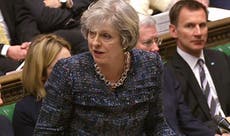The Supreme Court’s decision on Tuesday will be a defeat for Theresa May, but it’s Labour that will really suffer
Most Labour MPs represent seats that voted to leave the EU, even if most Labour voters – and the MPs themselves – actually wanted to remain


The Prime Minister should never have allowed the Brexit case to go to court. She could have avoided the embarrassment of the Supreme Court ruling against her on Tuesday. It is likely to decide that the Government cannot begin the procedure for leaving the European Union without an Act of Parliament.
This is a guess, rather than inside information. Theresa May – who has probably been told because not even Supreme Court judges can keep secrets – hinted at defeat when answering questions in the Commons on Wednesday: “We shall have to consider the result of the decision of the Supreme Court, which may, if it goes against the Government, require legislation.”
What we will find out at 9.30 on Tuesday morning is how the 11 judges have divided, and what they have said about the subsidiary questions before them. One of those is whether the Scottish Parliament or the Northern Ireland Assembly has any way of delaying or blocking Brexit. I think that is unlikely – again not because I have inside information but because, if the Court had decided anything that might threaten May’s timetable for Brexit, I think the tremors of alarm emanating from Downing Street would have been detectable by now.
On the main question, however, the Government is preparing to lose. It won’t make much practical difference, because Parliament will pass the Act well before the end of March, which is May’s target date. Which is why she should have put it to Parliament in the first place.
The reason for refusing to do so was a misguided attempt to preserve the Government’s – and therefore the Prime Minister’s – power over international treaties. The convention is that the Government negotiates treaties and Parliament ratifies them afterwards. EU membership is unusual, however, because Article 50 of the EU Treaty requires a member state to make a decision two years before it actually leaves.
So the Prime Minister will try to pretend that she hasn’t been forced to put a Bill through Parliament and will say that everything is going to plan, because she is sticking to her timetable. She will be able to do that because there is a majority in both Houses of Parliament for triggering Article 50. Which is why, on Tuesday, attention will turn not to Theresa May’s defeat but to the agonies of the Labour Party.
The reason there is a large majority in the Commons for Article 50 is that most Labour MPs support it. Jeremy Corbyn confirmed on Thursday that this was the policy of the official opposition: “I’ve made it very clear, the Labour Party accepts and respects the decision of the British people. We will not block Article 50.”
His MPs would be “asked” to vote for it, he said. When this was reported as a three-line whip for Article 50, however, Labour spokespeople went into reverse and said nothing had been decided. The main effect of giving Parliament a vote, therefore, is to expose divisions in the Labour Party.
The same thing happened last month when Keir Starmer, the shadow Brexit Secretary, tabled a motion demanding the Government publish its plan for Brexit (which it did in the form of a speech from the Prime Minister on Tuesday). The Government amended it to say Article 50 should be triggered by the end of March, and the whole thing was carried by 448 votes to 75; 23 Labour MPs broke with the party whip to vote against and many more abstained.
Now there is talk of between 60 and 80 Labour MPs voting against Brexit. Tim Farron, who is positioning the Liberal Democrats as the main anti-Brexit party in England, says: “I have lost count of the number of Labour MPs who’ve told me they wished they could argue what we’ve been arguing.” That doesn’t say much about his number skills, because I suspect that 80 is higher than he would need to count to.
The point is, though, that most Labour MPs will vote to pass the Bill. This is not because Corbyn is trying to impose an old-fashioned leftist ideology on a reluctant parliamentary party. Most Labour MPs represent seats that voted to leave, even if most Labour voters, and they themselves, wanted to remain. The Labour peers, who for some months unilaterally declared independence from Corbyn and refused to attend his shadow cabinet, have also said they won’t obstruct Brexit. That means the House of Lords will pass the Bill too.
There will be attempts to amend the Bill, and it is possible that “soft” amendments that are not designed to obstruct it might succeed, especially in the Lords. An amendment to guarantee the rights of EU citizens already here, for example.
But the Bill will go through and the main story of its passage is likely to be Labour disarray. It is only after it is passed, Article 50 invoked and the negotiations begin that Labour has any chance of turning the debate round to a forensic critique of the Government’s policy. For Corbyn and Starmer, 31 March cannot come soon enough.
* The image at the top of this article shows pro-EU protesters making their voices heard against the government's case. We originally miscaptioned it to suggest they were "Brexiters" protesting against a parliamentary vote on Article 50.


Join our commenting forum
Join thought-provoking conversations, follow other Independent readers and see their replies